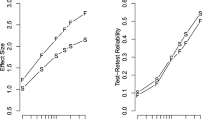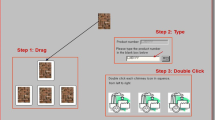Abstract
An alternating-treatment design was used to compare the productivity of college students engaged in a card-sorting task under an individual monetary incentive system and a 10-member group monetary incentive system. In both pay conditions, subjects received a base pay plus incentives contingent upon the number of cards sorted in 20-minute sessions. In the individual incentive condition, subjects earned $0.005 for each card sorted over 400 cards. In the group incentive condition, incentives were based on the group average, with all subjects earning $0.005 for each card by which the group average exceeded 400. Subjects received feedback on their performance and the performance of other group members in both conditions. The number of cards sorted did not differ significantly under the two pay systems. Subjects reported the systems to be equally enjoyable and demanding, however, when asked which pay system they would prefer to work under in the future, high performers chose the individual incentive system, and low performers chose the group incentive system.
Similar content being viewed by others
References
BARLOW, D. H., & HAYES, S. C. (1979). Alternating-treatments design: One strategy for comparing the effects of two treatments in a single subject. Journal of Applied Behavior Analysis, 12, 199–210.
BARTIS, R., SZYMANSKI, K., & HARKINS, S. G. (1988). Evaluation and performance: A two-edged knife. Personality and Social Psychology Bulletin, 14, 242–251.
BLINDER, A. S. (1990). Introduction. In A. S. Blinder (Ed.), Paying for productivity: A look at the evidence (pp. 1–13). Washington, DC: The Brookings Institution.
CAMPBELL, H. (1952). Group incentive payment schemes: The effects of lack of understanding and group size. Occupational Psychology, 26, 15–21.
DIERKS, W., & MCNALLY, K. (1987). Incentives you can bank on. The Personnel Administrator, 32, 61–65.
DICKINSON, A. M., & GILLETTE, K. L. (1993). A comparison of the effects of two individual monetary incentive systems on productivity: Piece rate pay versus base pay plus incentives. Journal of Organizational Behavior Management, 14, 3–82.
FARR, J. L. (1976). Incentive schedules, productivity and satisfaction in work groups. Organizational Behavior and Human Performance, 17, 159–170.
FLANNERY, T. P., HOFRICHTER, D. A., & PLATTEN, P. E. (1996). People, performance and pay: Dynamic compensation for changing organizations. New York: Free Press.
GOWEN, C. R. (1991). Gainsharing programs: An overview of history and research. Journal of Organizational Behavior Management, 11, 77–99.
GROSS, S. E. (1995). Compensation for teams: How to design and implement team-based reward programs. New York: AMACOM.
GUERIN, B. (1994). Analyzing social behavior: Behavior analysis and the social sciences. Reno: Context Press.
HARKINS, S. G. (1987). Social loafing and social facilitation. Journal of Experimental Social Psychology, 23, 1–18.
HARKINS, S. G., & JACKSON, J. M. (1985). The role of evaluation in eliminating social loafing. Personality and Social Psychology Bulletin, 11, 456–465.
HARKINS, S. G., & SZYMANSKI, K. (1987). Social loafing and social facilitation: New wine in old bottles. In C. Hendrick (Ed.), Group process and intergroup relations (pp. 167–188). London: Sage.
HARKINS, S. G., & SZYMANSKI, K. (1988). Social loafing and self-evaluation with an objective standard. Journal of Personality and Social Psychology, 24, 354–365.
HARKINS, S. G., & SZYMANSKI, K. (1989). Social loafing and group evaluation. Journal of Personality and Social Psychology, 56, 934–941.
LATANE, B., WILLIAMS, K., & HARKINS, S. (1979). Many hands make light the work: The cases and consequences of social loafing. Journal of Personality and Social Psychology, 37, 822–832.
LAWLER, E. E., III. (1990). Strategic pay: Aligning organizational strategies and pay systems. San Francisco: Jossey Bass.
LONDON, M., & OLDHAM, G. (1977). A comparison of group and individual incentive plans. Academy of Management Journal, 20, 34–41.
MARRIOTT, R. (1949). Size of working group and output. Occupational Psychology, 23, 47–57.
ORGAN, D. W., & BATEMAN, T. (1986). Organizational behavior (3rd ed.). Plano, TX: Business Publications.
PECK, C. (1990). Variable pay: New performance rewards (Research Bulletin No. 246). New York: The Conference Board.
PRITCHARD, R. D., & CURTIS, M. I. (1973). The influence of goal setting and financial incentives on task performance. Organizational Behavior and Human Performance, 10, 175–183.
STONEMAN, K. G., & DICKINSON, A. M. (1989). Individual performance as a function of group contingencies and group size. Journal of Organizational Behavior Management, 10, 131–150.
SZYMANSKI, K., & HARKINS, S. G. (1987). Social loafing and self-evaluation with a social standard. Journal of Personality and Social Psychology, 53, 891–897.
SZYMANSKI, K., & HARKINS, S. G. (1993). The effect of experimenter evaluation on self-evaluation within the social loafing paradigm. Journal of Experimental Social Psychology, 29, 268–286.
WELLINS, R. S., BYHAM, W. C., & WILSON, J. M. (1991). Empowered teams. San Francisco: Jossey-Bass.
WILLIAMS, K. D., HARKINS, S. G., & LATANE, B. (1981). Identifiability as a deterrent to social loafing: Two cheering experiments. Journal of Personality and Social Psychology, 40, 303–311.
Author information
Authors and Affiliations
Corresponding author
Additional information
This study was conducted as the Master’s thesis of Judith Honeywell and was supported in part by grants from Aubrey Daniels and Associates and from The Graduate College, Western Michigan University. The authors express appreciation to those who assisted in data collection: B. Dorset, N. Eikenhout, T. Garcia, R. Johnson, and T. Nolan.
Rights and permissions
About this article
Cite this article
Honeywell, J.A., Dickinson, A.M. & Poling, A. Individual performance as a function of individual and group pay contingencies. Psychol Rec 47, 261–274 (1997). https://doi.org/10.1007/BF03395224
Published:
Issue Date:
DOI: https://doi.org/10.1007/BF03395224




